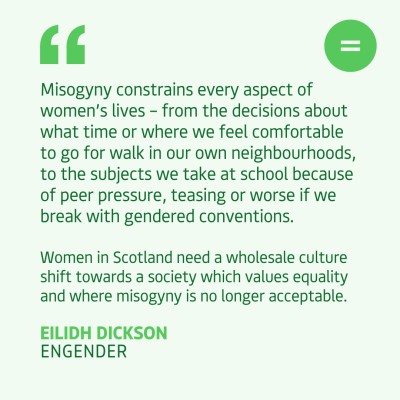Engender blog
GUEST POST: Digital abuse against feminist scholars: a case study
Engender and the Equal Media and Culture Centre for Scotland have hosted student placements from the MSc in Social Research at the University of Edinburgh and the University of Strathclyde Applied Gender Studies and Research Methods course. As part of their research outputs, the students have produced a series of blogs.
In this post, Yoke explores a case study of the online backlash and digital abuse experienced by feminist researchers and scholars.
![The graphic shows a light blue background with white left-aligned text quote that reads "Research has shown that when women speak publicly about ‘controversial’ topics, such as feminism, this triggers online abuse. [...] These attacks must be recognised as part of a historical pattern of violent repercussions against those who defy patriarchal, white supremacist, capitalist dominance.". The quote is attributed to Yoke Baeyens, Student Placement, University of Strathclyde. In the top right-hand corner of the graphic there is the Equal Media and Culture Centre logo.](/siteimages/Blog/yoke-blog-2.png)
Online abuse is used as a silencing mechanism against women and other minoritised identities in the public (online) space.
Weaponising misogyny and dehumanisation techniques, perpetrators aim to push their targets outside the public sphere, to reinstate misogynistic, heteronormative dominance. These public displays of violence also serve to remind and threaten others who might want to defy misogynist, white supremacist, and heteronormative power structures. As Gosse et al. (2021) state, online abuse causes scholars and journalists to self-censor and choose ‘safe’ topics to discuss publicly in an attempt to protect themselves, thereby upholding the status quo. Indeed, research has shown that when women speak publicly about ‘controversial’ topics, such as feminism, this triggers online abuse. This is particularly a problem for feminist scholars who use social media to spread information on feminist research. These attacks must be recognised as part of a historical pattern of violent repercussions against those who defy patriarchal, white supremacist, capitalist dominance. Women have always been the target of abuse, and while the medium is new and everchanging, the intention is not.
Using the law to tackle misogyny
Engender’s Policy and Parliamentary Manager, Eilidh Dickson, has been a member of the Independent Working Group on Misogyny chaired by Baroness Helena Kennedy. Here she reflects on the final report released today:

Misogyny constrains every aspect of women’s lives – from the decisions about what time or where we feel comfortable to go for walk in our own neighbourhoods, to the subjects we take at school because of peer pressure, teasing or worse if we break with gendered conventions. Women in Scotland need a wholesale culture shift towards a society which values equality and where misogyny is no longer acceptable. For a number of years Engender has been calling for a standalone criminal offence based on misogyny; using the law as one piece of the puzzle to making women safer in Scotland.
Downloads
 Engender Briefing: Pension Credit Entitlement Changes
From 15 May 2019, new changes will be introduced which will require couples where one partner has reached state pension age and one has not (‘mixed age couples’) to claim universal credit (UC) instead of Pension Credit.
Engender Briefing: Pension Credit Entitlement Changes
From 15 May 2019, new changes will be introduced which will require couples where one partner has reached state pension age and one has not (‘mixed age couples’) to claim universal credit (UC) instead of Pension Credit.
 Engender Parliamentary Briefing: Condemnation of Misogyny, Racism, Harassment and Sexism
Engender welcomes this Scottish Parliament Debate on Condemnation of Misogyny, Racism, Harassment and Sexism and the opportunity to raise awareness of the ways in which women in Scotland’s inequality contributes to gender-based violence.
Engender Parliamentary Briefing: Condemnation of Misogyny, Racism, Harassment and Sexism
Engender welcomes this Scottish Parliament Debate on Condemnation of Misogyny, Racism, Harassment and Sexism and the opportunity to raise awareness of the ways in which women in Scotland’s inequality contributes to gender-based violence.
 Gender Matters in Social Security: Individual Payments of Universal Credit
A paper calling on the Scottish Government to automatically split payments of Universal Credit between couples, once this power is devolved to the Scottish Parliament.
Gender Matters in Social Security: Individual Payments of Universal Credit
A paper calling on the Scottish Government to automatically split payments of Universal Credit between couples, once this power is devolved to the Scottish Parliament.
 Gender Matters Manifesto: Twenty for 2016
This manifesto sets out measures that, with political will, can be taken over the next parliamentary term in pursuit of these goals.
Gender Matters Manifesto: Twenty for 2016
This manifesto sets out measures that, with political will, can be taken over the next parliamentary term in pursuit of these goals.
 Scottish NGO Briefing for UN Special Rapporteur on Violence Against Women
Joint briefing paper for the UN Rapporteur on Violence Against Women.
Scottish NGO Briefing for UN Special Rapporteur on Violence Against Women
Joint briefing paper for the UN Rapporteur on Violence Against Women.

Newsletter
Sign up to receive our newsletter here:
Sign up to our mailing list
Receive key feminist updates direct to your inbox: